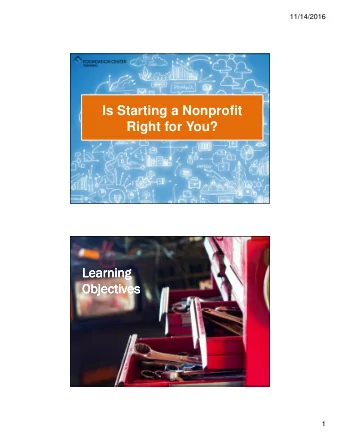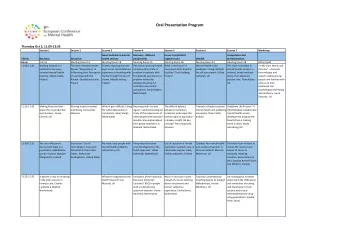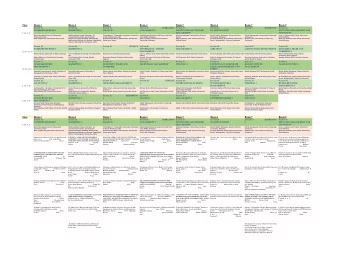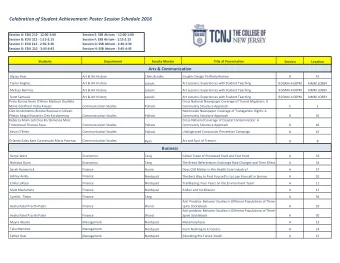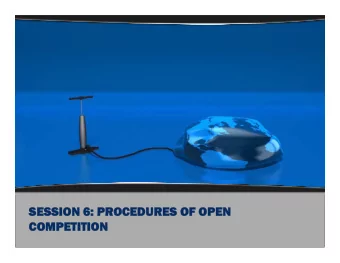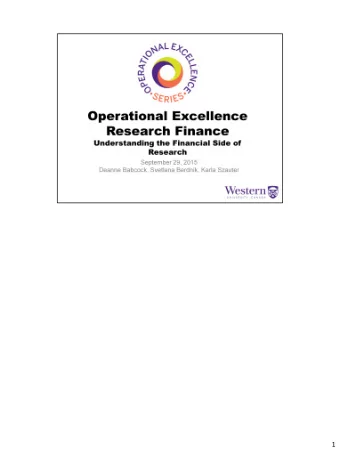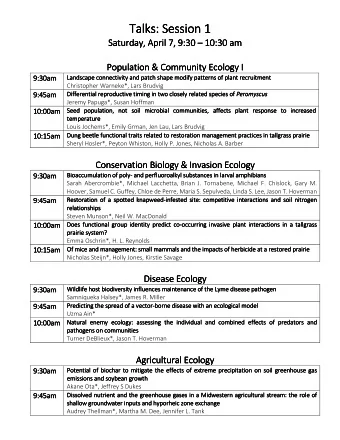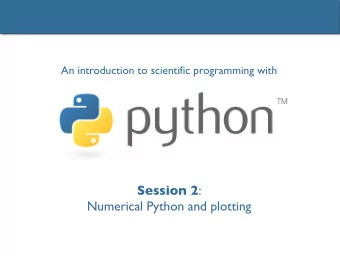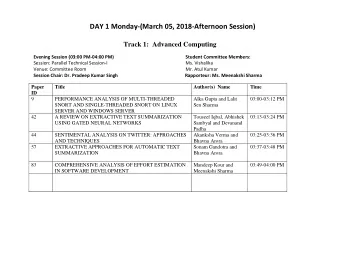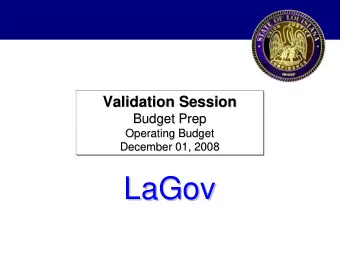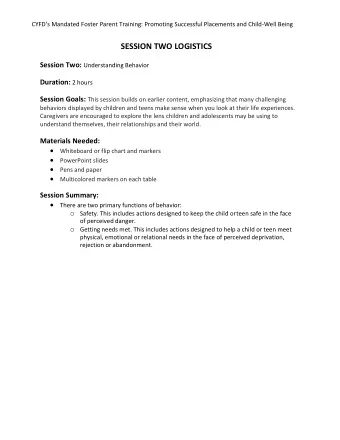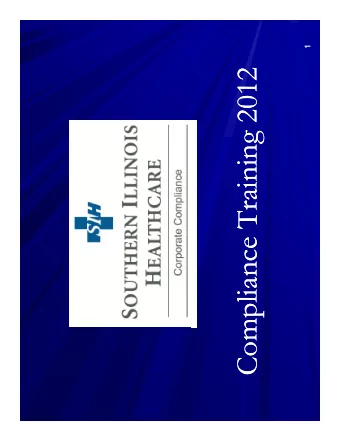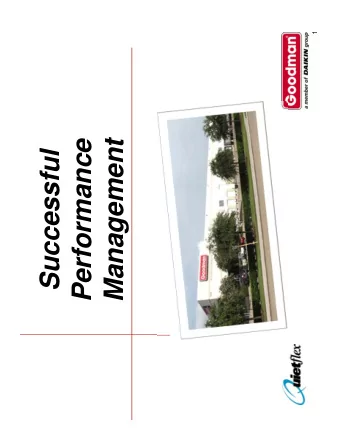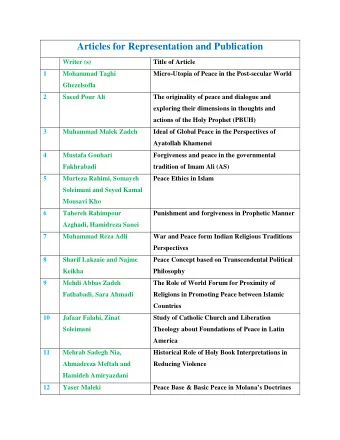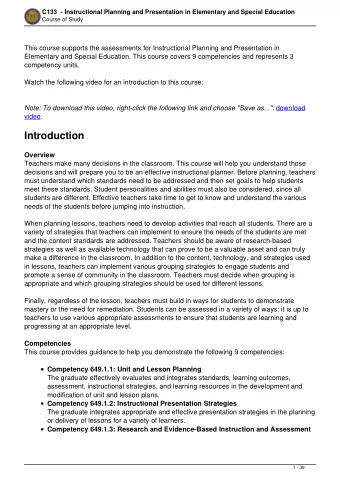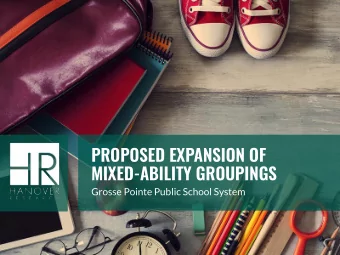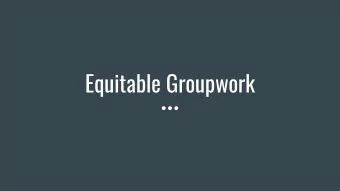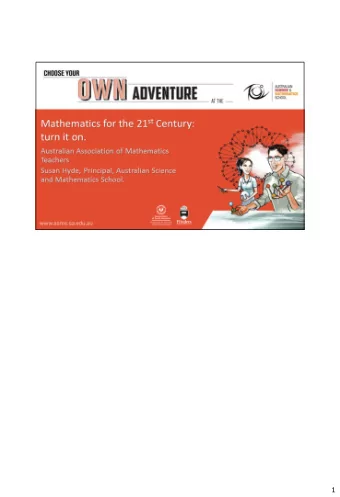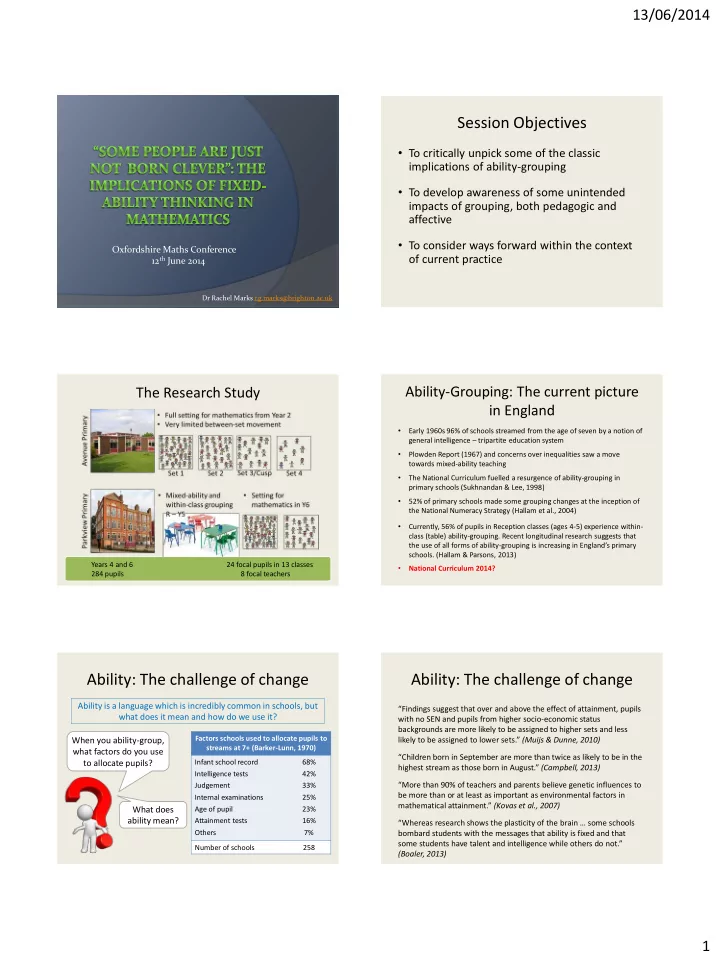
Session Objectives To critically unpick some of the classic - PDF document
13/06/2014 Session Objectives To critically unpick some of the classic implications of ability-grouping To develop awareness of some unintended impacts of grouping, both pedagogic and affective To consider ways forward within the
13/06/2014 Session Objectives • To critically unpick some of the classic implications of ability-grouping • To develop awareness of some unintended impacts of grouping, both pedagogic and affective • To consider ways forward within the context Oxfordshire Maths Conference of current practice 12 th June 2014 Dr Rachel Marks r.g.marks@brighton.ac.uk Ability-Grouping: The current picture The Research Study in England • Early 1960s 96% of schools streamed from the age of seven by a notion of general intelligence – tripartite education system • Plowden Report (1967) and concerns over inequalities saw a move towards mixed-ability teaching • The National Curriculum fuelled a resurgence of ability-grouping in primary schools (Sukhnandan & Lee, 1998) • 52% of primary schools made some grouping changes at the inception of the National Numeracy Strategy (Hallam et al., 2004) • Currently, 56% of pupils in Reception classes (ages 4-5) experience within- class (table) ability-grouping. Recent longitudinal research suggests that the use of all forms of ability- grouping is increasing in England’s primary schools. (Hallam & Parsons, 2013) Years 4 and 6 24 focal pupils in 13 classes • National Curriculum 2014? 284 pupils 8 focal teachers Ability: The challenge of change Ability: The challenge of change Ability is a language which is incredibly common in schools, but “ Findings suggest that over and above the effect of attainment, pupils what does it mean and how do we use it? with no SEN and pupils from higher socio-economic status backgrounds are more likely to be assigned to higher sets and less Factors schools used to allocate pupils to likely to be assigned to lower sets .” (Muijs & Dunne, 2010) When you ability-group, streams at 7+ (Barker-Lunn, 1970) what factors do you use “Children born in September are more than twice as likely to be in the Infant school record 68% to allocate pupils? highest stream as those born in August.” (Campbell, 2013) Intelligence tests 42% “More than 90% of teachers and parents believe genetic influences to Judgement 33% be more than or at least as important as environmental factors in Internal examinations 25% mathematical attainment .” (Kovas et al., 2007) What does Age of pupil 23% ability mean? Attainment tests 16% “Whereas research shows the plasticity of the brain … some schools Others 7% bombard students with the messages that ability is fixed and that some students have talent and intelligence while others do not.” Number of schools 258 (Boaler, 2013) 1
13/06/2014 Ability: The challenge of change • The English education system is predicated by a fixed mindset • Interpretations of policy requirements sustain a fixed mindset approach The White Paper … argues in favour of more “…we’re campaigning now for the setting … It envisages further expansion of the adoption of the teaching methods gifted and talented programme and an increase which mark out the very best. in grouping and setting of pupils by ability. Setting by ability so that the (DfES, 2005) strongest can be stretched and the weakest given extra help.” “It seems to me that 1000 kids in a (Gove, 2007) comprehensive, sooner or later, the ones who are good at maths will have to be told ‘you are good at maths’ and the ones who aren’t, will Fixed mindsets are have to be told ‘you are not good at maths’ … you should be learning as a young person that so pervasive they there are limits to what you can do .” go unquestioned (Richard D. North, The Big Questions, 2009) http://educationendowmentfoundation.org.uk/toolkit/ Pupils’ Beliefs about Ability The Implications of Ability-Grouping Rachel: So what makes someone good at maths? Wynne (Y4): Their brain’s bigger. And they’re cleverer and better … it just happens. They were born like that. They were born clever. Rachel: And what might make someone not good at maths? Zackary (Y4): Some people are just not born clever. Yolanda (Y4): Some people are really good at maths and some people aren’t that good at maths. Probably it sometimes runs in the family. Rachel: How much further could you make yourself better? Peter (Y6): Just about here, not a huge way, well because you can only do so much can’t you? 70% of pupils’ comments reflected a fixed -mindset with a belief that mathematical ability was limited and genetically determined The Implications of Ability-Grouping: The Implications of Ability-Grouping: Limited Opportunities for All? Limiting discussion Peter: The person down here [worst at maths], the teacher would Top Bottom Implications (Set 4) Sets Sets never ask them any questions because they know that they would be silly and everything when they answer them, and Extends traditional so the teacher won’t involve them in lessons. They could Procedural Low level work, views of maths & limits learning small numbers get better, but no one would know because the teacher space for extension wouldn’t pick them, it would be very difficult for them to Limited access to Putting aside Use of show they were better. efficient methods and ‘real life’ manipulatives advanced mathematics Megan: If you are quite clever in some way, sometimes you don’t Lack of peer-support, Fast paced Behavioural (Set 1) want to get something wrong because other people might discussion and competitive control mathematical talk say something about that, so I would rather not say lessons anything. Fear of making Teachers protect Reduced access to mistakes in pupils from interesting mathematics front of peers ‘hard maths’ 2
13/06/2014 The Pressures to, and Implications of, Triage in Action: Educational Outcomes Ability-Grouping: Educational triage Set 3 (Cusp) Set 4 Mr Iverson: Usually we put the strongest • Set 1 & Set 2 students teacher in the Cusp Group. make the expected Supply teacher or Strongest teacher Mrs Jerrett: With the Cusp Group you Higher Level with specialist gain Teaching have to, sort of, you know, push open training Assistant (HLTA) those doors a bit and not be frightened • Over the academic and say right, what about these numbers year, Set 3 attained a … the idea is to push them up and get No dedicated Dedicated Year 6 them moving. learning space mean maths gain of classroom and and limited resources resources over one year and four Samuel: The different groups get different things, I want Mr Quinton [Cusp months Different Group], they have fun […] methods Year 1 and 2 • Set 4 attained a mean encouraged, individual some problem- James: It’s soooo different. They worksheets gain of seven months solving don’t care about us being happy, we don’t have nothing, no resources in Follows Primary Limited lessons, nothing. We don’t have nothing Framework and mathematical to use. access, no SATs prepares for SATs preparation The Implications of Ability-Grouping: The Implications of Ability-Grouping: Other impacts Other impacts “Maths before lunch I’m not very good with because I am having bad lunchtimes and I have to go and tell Mr Iverson when I am feeling fine and when I am not. I normally like maths before break or after lunch, but not before lunch.” (Wynne, Year 4, Avenue Primary) “In our group we could have done more get up and do but in that computer room there isn’t a lot of space and you know in the corridor you’re a bit constrained and a bit public as well because everyone is walking through.” (Mrs Jerrett, Year 4, Avenue Primary) Why does ability-grouping matter? What • 88% of all those children placed in streams or sets, as they now are on government Inflexibility does recommendation from four and a half, will remain in those same groupings until they leave school. (Dixon, 2002) change mean? • Misplacement in within-as well as across-class groups may be a significant phenomenon. Misplacement • There is even an overlap in scores of the children in high and low-ability mathematics groups. (Macintyre & Ireson, 2002) • Ability-grouping impacts persist beyond formal “Do people with this mindset believe that anyone can be anything … No, but they education. There appear to be social justice believe that a person’s true potential is unknown (and unknowable); that it’s Long-Term outcomes with students taught under equitable impossible to foresee what can be accomplished with years of passion, toil, and structures more likely to enter higher status training.” careers. (Boaler, 2005) (Dweck, 2006, p.7) 3
Recommend
More recommend
Explore More Topics
Stay informed with curated content and fresh updates.
